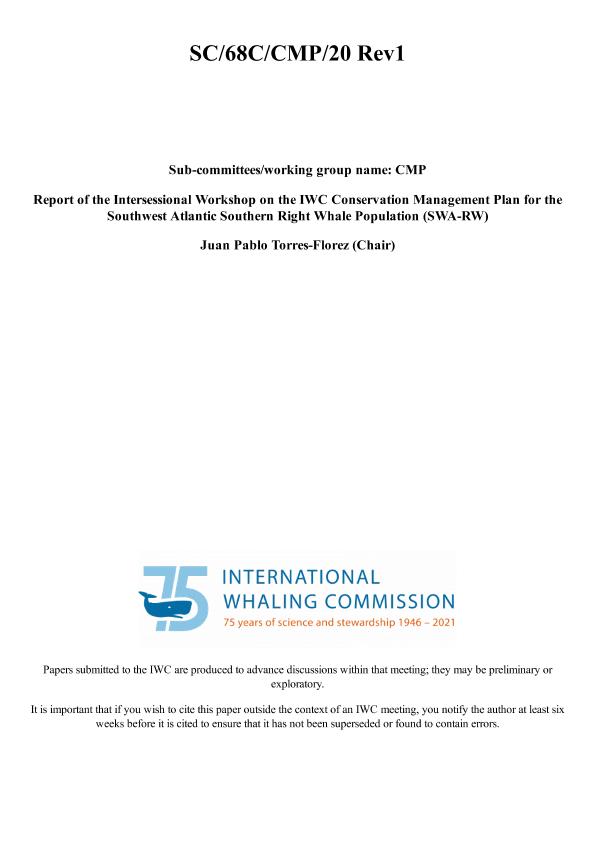Mostrar el registro sencillo del ítem
dc.contributor.author
Zerbini, Alexandre

dc.contributor.author
Fernández, Santiago José

dc.date.available
2023-01-02T20:12:40Z
dc.date.issued
2021
dc.identifier.citation
Update on satellite tracking of Western South Atlantic southern right whales from Península Valdés and adjacent areas, Argentina; Intersessional Workshop on the IWC Conservation Management Plan for the Southwest Atlantic Southern Right Whale Population; Cambridge; Reino Unido; 2021; 34-35
dc.identifier.uri
http://hdl.handle.net/11336/183007
dc.description.abstract
Satellite tracking of Southern right whales wintering near Península Valdés, Argentina, began in 2014 (Zerbini et al., 2016, 2018) and corresponds to one of the scientific actions of the western South Atlantic right whale CMP (CMP Res-01). The original goal of this study was to describe the movements, diving behavior, migratory routes and feeding destinations of the whales. However, since 2019 the tagged whales have also been systematically monitored after tag deployment as part of a larger initiative to assess effects of tags on individual whales. Since 2014, a total of 39 (33 location-only and 6 archival) “transdermal” consolidated Type C (as defined by Andrews et al., 2019) satellite tags have been deployed on SRWs, with three tags not transmitting due to poor implantation (and therefore not considered in the data provided below). These instruments were deployed on solitary individuals (n=23) and mothers (n=13) in Golfo Nuevo (n=27) and Golfo San Matías (n=9). In addition to the transdermal tags, a new Type C “blubber-only” tag under development for right whales was deployed in 2019 in Golfo Nuevo (n=8). The latter tag represents an initiative to develop and assess performance of less invasive implantable tags for large cetaceans with support from the US Office of Naval Research (ONR) and the National Oceanic and Atmospheric Administration (NOAA). Transdermal transmitter duration has been 115 days on average (range: 18-237 days) for location only tags and 95 days (71-126) for archival tags. The 2019 season, when a new anchor design was introduced, was the most successful tracking season of this project with a mean tag duration of 134 days (range: 18-216 days). Median duration of an initial design of a blubber-only tag was 16 days (mean = 21, range: 14-34 days). Further surface modifications are expected to the blubber-only tag design to improve their retention time. Satellite tracking revealed novel and unique movement patterns of SRWs at various scales. New information has been obtained on (1) residency times and occupancy patterns of solitary individuals and mothers and calves in Golfo Nuevo and Golfo San Matias, (2) whale connectivity among different northern Patagonian gulfs and coastal habitats along the eastern coast of South America, and (3) migratory routes and habitat use on feeding destinations, including the Patagonian shelf, the western South Atlantic basin, the Scotia Sea and the northern Weddell sea. This study has also revealed the use of open ocean oceanographic features by SRWs, presumably for feeding, in middle latitudes of the South Atlantic basin. The project is expected to continue in 2021 and possibly 2022 and instrumentation of an additional 15-30 individuals are planned for upcoming field seasons. Project participants are greatly indebted to the International Whaling Commission, the National Government of Argentina and the Provincial Governments of Chubut and Rio Negro for logistical support and for facilitating/issuing permits for this work to be conducted.
dc.format
application/pdf
dc.language.iso
eng
dc.publisher
International Whaling Commission
dc.rights
info:eu-repo/semantics/openAccess
dc.rights.uri
https://creativecommons.org/licenses/by-nc-sa/2.5/ar/
dc.subject
BALLENA FRANCA AUSTRAL
dc.subject
TELEMETRÍA SATELITAL
dc.subject
PENINSULA VALDES
dc.subject
FEEDING AREAS
dc.subject.classification
Ecología

dc.subject.classification
Ciencias Biológicas

dc.subject.classification
CIENCIAS NATURALES Y EXACTAS

dc.title
Update on satellite tracking of Western South Atlantic southern right whales from Península Valdés and adjacent areas, Argentina
dc.type
info:eu-repo/semantics/publishedVersion
dc.type
info:eu-repo/semantics/conferenceObject
dc.type
info:ar-repo/semantics/documento de conferencia
dc.date.updated
2022-12-28T10:21:58Z
dc.journal.pagination
34-35
dc.journal.pais
Reino Unido

dc.journal.ciudad
Cambridge
dc.description.fil
Fil: Zerbini, Alexandre. Joint Institute For The Study Of The Atmosphere And Oce; Estados Unidos
dc.description.fil
Fil: Fernández, Santiago José. Consejo Nacional de Investigaciones Científicas y Técnicas. Centro Científico Tecnológico Conicet - Centro Nacional Patagónico. Centro para el Estudio de Sistemas Marinos; Argentina. Universidad Nacional de la Patagonia. Facultad de Ciencias Naturales. Sede Puerto Madryn; Argentina
dc.relation.alternativeid
info:eu-repo/semantics/altIdentifier/url/https://archive.iwc.int/pages/view.php?ref=6266&k=&search=%21collection24474&offset=0&order_by=relevance&sort=DESC&archive=0
dc.conicet.rol
Autor

dc.conicet.rol
Autor

dc.coverage
Internacional
dc.type.subtype
Workshop
dc.description.nombreEvento
Intersessional Workshop on the IWC Conservation Management Plan for the Southwest Atlantic Southern Right Whale Population
dc.date.evento
2021-04-14
dc.description.ciudadEvento
Cambridge
dc.description.paisEvento
Reino Unido

dc.type.publicacion
Book
dc.description.institucionOrganizadora
International Whaling Commission
dc.source.libro
Report of the Intersessional Workshop on the IWC Conservation Management Plan for the Southwest Atlantic Southern Right Whale Population (SWA-RW)
dc.date.eventoHasta
2021-04-16
dc.type
Workshop
Archivos asociados
